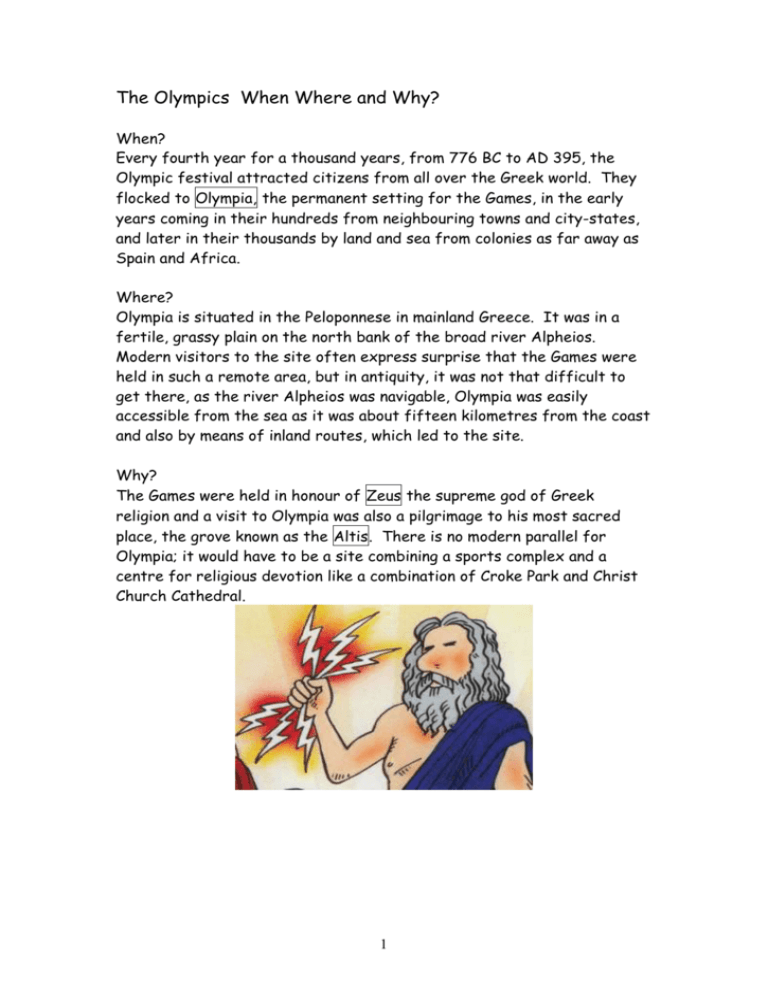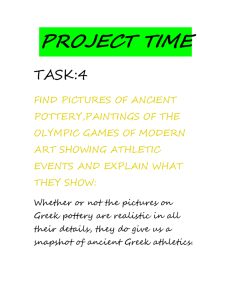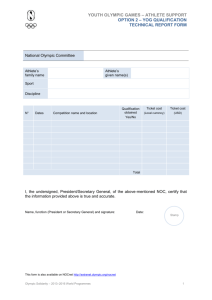The Olympic Games
advertisement

The Olympics When Where and Why? When? Every fourth year for a thousand years, from 776 BC to AD 395, the Olympic festival attracted citizens from all over the Greek world. They flocked to Olympia, the permanent setting for the Games, in the early years coming in their hundreds from neighbouring towns and city-states, and later in their thousands by land and sea from colonies as far away as Spain and Africa. Where? Olympia is situated in the Peloponnese in mainland Greece. It was in a fertile, grassy plain on the north bank of the broad river Alpheios. Modern visitors to the site often express surprise that the Games were held in such a remote area, but in antiquity, it was not that difficult to get there, as the river Alpheios was navigable, Olympia was easily accessible from the sea as it was about fifteen kilometres from the coast and also by means of inland routes, which led to the site. Why? The Games were held in honour of Zeus the supreme god of Greek religion and a visit to Olympia was also a pilgrimage to his most sacred place, the grove known as the Altis. There is no modern parallel for Olympia; it would have to be a site combining a sports complex and a centre for religious devotion like a combination of Croke Park and Christ Church Cathedral. 1 Other national Games The Olympic Games are the oldest of the four Pan Hellenic or national athletic festivals, the others are The Pythian Games at Delphi, held in honour of Apollo. Apollo was the god of hunting as well as sun, medicine, prophecy and music. The Isthmian Games held at Corinth for Poseidon. Poseidon was the god of the sea. The Nemean Games, which like the Olympics, were in honour of Zeus, king of the gods. 2 Greek states and colonies 3 The Olympic Truce OK LADS, Truce Bearers HAVE ARRIVED, OLYMPIC GAMES ARE ON. WEAPONS DOWN, TIME FOR A REST! Greek Hoplites In order to spread the news of the Truce before the beginning of the Olympic festival, three heralds wearing olive wreaths and carrying staffs were sent out from Elis to every Greek state. It was the heralds’ duty to announce the exact date of the festival, and to announce the Olympic Truce. They were called the Truce-Bearers, ‘Spondophoroi’. It forbade states participating the Games to take up arms, and no armed forces were allowed to enter the sacred territory where the games were held. This was to ensure that pilgrims and athletes, artists and their families could travel in total safety. Violators of the truce were heavily fined. In 420 BC the Spartans engaged in a military manoeuvre in the territory of Elis during the Truce using 1000 hoplites or soldiers. As a result they were fined 200 drachmas per hoplite, a total of 2 million – a lot of money! The Spartans refused to pay the penalty claiming that their manoeuvre had been completed before the Olympic Truce was officially announced. The Spartans participation in the Olympic Games that year were prohibited. 4 Name:________________________ The Olympic Games 1. In which year did the Olympic games begin? _______________________________________________________________ 2. Why were the games held? _______________________________________________________________ 3. What was known as the Altis? _______________________________________________________________ 4. Where is Olympia situated? _______________________________________________________________ 5. Was it easy to travel to Olympia in ancient times? Give reasons. ______________________________________________________________ ______________________________________________________________ APOLLO Have to put my lyre down for a while! I’m off to ______________, to watch the games being held there in my honour 5 Where are the games held in my honour? ___________________________ 6. What was the Olympic truce? ________________________________________________ ________________________________________________ ________________________________________________ ________________________________________________ 7. What happened to the Spartans when they engaged in military manoeuvres during the truce? ________________________________________________ ________________________________________________ ________________________________________________ 8. Do you think that, if we had a similar truce today for our modern Olympics it would work? Give reasons for your answer. ________________________________________________ ________________________________________________ ________________________________________________ ________________________________________________ 6






